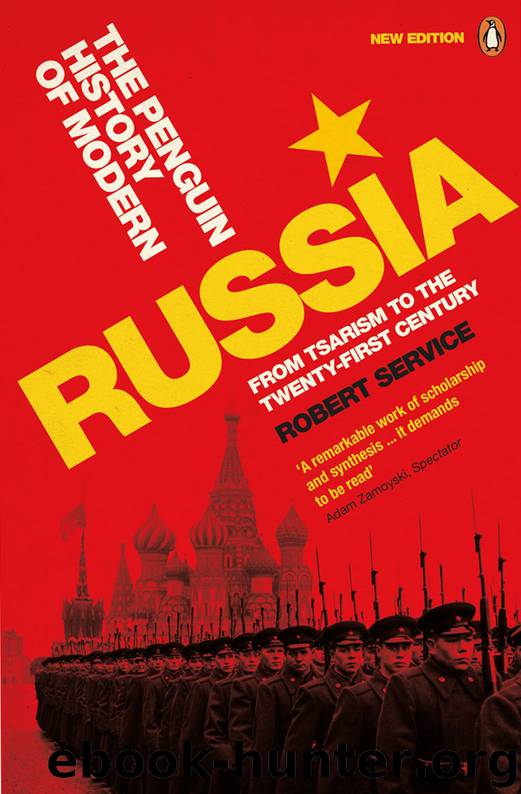The Penguin History of Modern Russia by Robert Service

Author:Robert Service
Language: eng
Format: epub
ISBN: 9780141931913
Publisher: Penguin Books Ltd
Published: 2009-08-11T16:00:00+00:00
18
Hopes Unsettled
(1961–1964)
Khrushchëv still believed that history was on the side of communism. His confidence was infectious and attracted a lot of lower-echelon party functionaries and ambitious youngsters to his side. Like Stalin in the 1930s, he persuaded such people that the problems for communism in the USSR could be solved by a more rigorous application of the basic principles of Marxism-Leninism. This, he suggested, would necessarily involve a rejection of Stalin and a reversion to the ideals of Lenin. There were many people who responded to his summons to join the party and to help to change public life. The enthusiasts among them were known as ‘Children of the Twentieth Congress’.
They believed that a reformed Soviet order would quickly demonstrate its political and economic superiority over its Western rivals; they agreed with Khrushchëv that capitalism was like ‘a dead herring in the moonlight, shining brilliantly as it rotted’.1 Khrushchëv himself assumed that popular gratitude for his liberating influence would engender co-operation between the central political élite and society. He was proud of the achievements made for the average Soviet citizen. High-rise apartment blocks were put up in all cities. Diet went on improving. Meat consumption rose by fifty-five per cent between 1958 and 1965 alone.2 Fridges, televisions and even washing-machines entered popular ownership. The hospital and education services were free and universally available; rents, home heating and cooking fuel were very inexpensive. Labour discipline was relaxed.3 Unemployment was practically unknown. Wages rose after 1953 and kept on rising; in the RSFSR between 1959 and 1962, for instance, they increased by seven per cent.4
General financial provision had also been introduced for those who had retired from work. In fact the minimum annual pension was set at thirty roubles and was barely sufficient for subsistence;5 but Khrushchëv had made a start in tackling the problem and jobs were anyway available for many elderly citizens as concierges, doorkeepers and hotel cleaners. The retention of cheap urban cafeterias meant that neither pensioners nor the working poor starved.
Recreational clubs flourished. Lev Yashin, the soccer goalkeeper, was one among the many sportsmen adored by the population. Escapist entertainment was heard on Soviet radio. A very popular ditty began with the words:
Let there always be sunshine,
Let there always be sky,
Let there always be mama,
Let there always be me!
Download
This site does not store any files on its server. We only index and link to content provided by other sites. Please contact the content providers to delete copyright contents if any and email us, we'll remove relevant links or contents immediately.
| Africa | Americas |
| Arctic & Antarctica | Asia |
| Australia & Oceania | Europe |
| Middle East | Russia |
| United States | World |
| Ancient Civilizations | Military |
| Historical Study & Educational Resources |
Red Famine: Stalin's War on Ukraine by Anne Applebaum(2930)
Midnight in Chernobyl by Adam Higginbotham(2543)
Chernobyl by Serhii Plokhy(2536)
Midnight in Chernobyl: The Untold Story of the World's Greatest Nuclear Disaster by Adam Higginbotham(2227)
The House of Government by Slezkine Yuri(2201)
Red Shambhala by Andrei Znamenski(2193)
The Gulag Archipelago (Vintage Classics) by Aleksandr Solzhenitsyn(2098)
Red Notice by Bill Browder(2070)
All the Kremlin's Men by Mikhail Zygar(2064)
From Cold War to Hot Peace by Michael McFaul(2030)
Putin's Labyrinth(2017)
From Russia with Lunch by David Smiedt(1973)
The Future Is History by Masha Gessen(1906)
A People's Tragedy by Orlando Figes(1864)
The Romanovs by Simon Sebag Montefiore(1821)
How to Tame a Fox (and Build a Dog): Visionary Scientists and a Siberian Tale of Jump-Started Evolution by Lee Alan Dugatkin & Lyudmila Trut(1771)
Putin's Labyrinth: Spies, Murder, and the Dark Heart of the New Russia(1752)
The Lost Spy by Andrew Meier(1746)
Art and Revolution by John Berger(1721)
